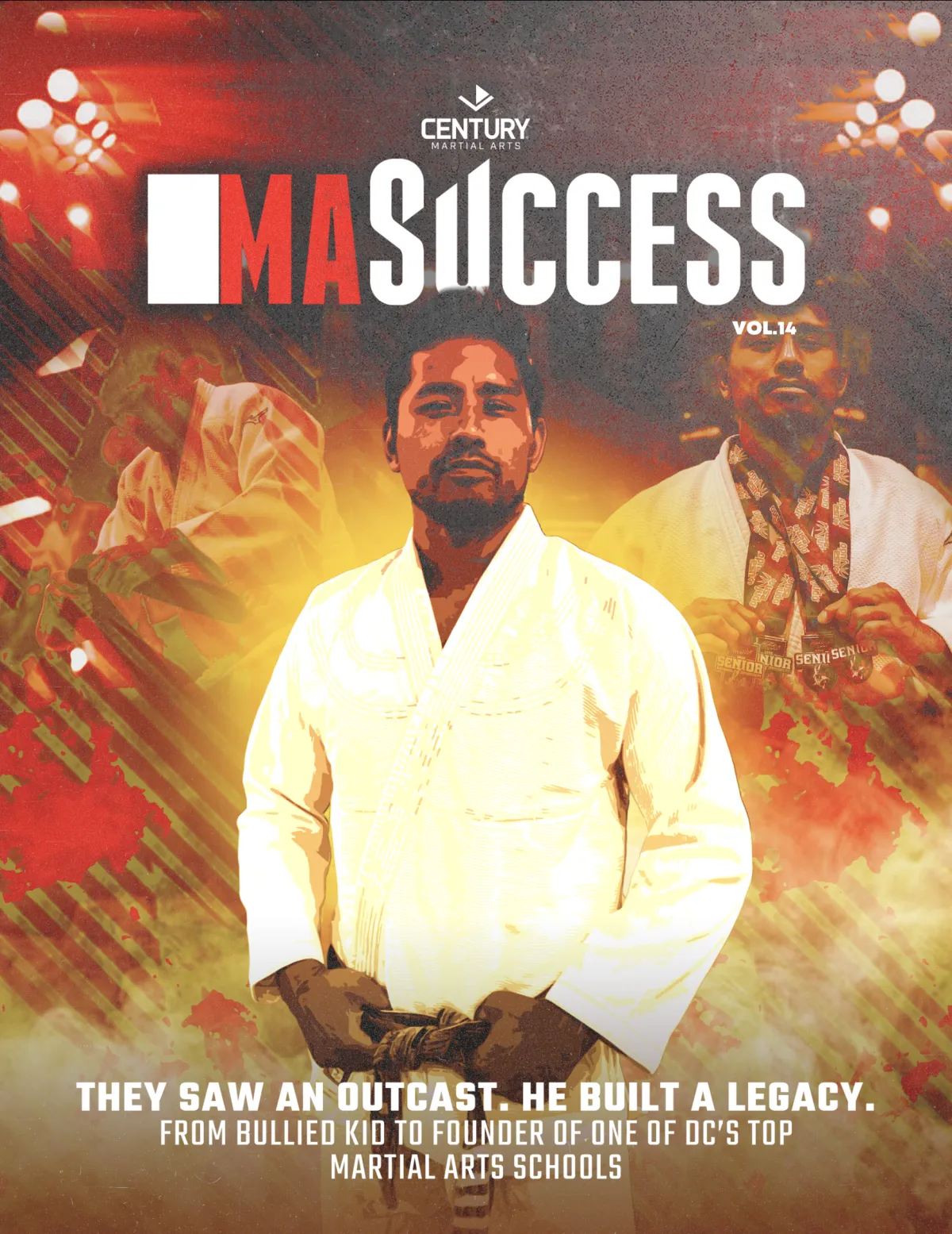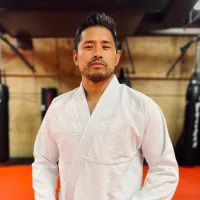Our Latest Articles

MA Success
THEY SAW AN OUTCAST. HE BUILT A LEGACY.

NAKAPAN PHUNGEPHORN'S STORY by MA Success
Early Upbringing: Fighting to Find His Place
"Revenge."
It was a half-joke, but behind it, lies the real reason Nakapan Phungephorn first stepped into the martial arts world. Born in the U.S. to Thai immigrant parents, Nakapan was a first-generation Thai American who faced more than his fair share of adversity growing up. "I did get beat up a lot as a kid... dressed funny, I got a funny name...l had a bully in every single grade."
Raised by his grandparents in a household that didn't reflect the affluence of the Bethesda, Maryland community around them, Nakapan struggled with fitting in. At 11, his body was further challenged by Lyme disease, rendering him unable to walk and was bound to a wheelchair for a month.
"I thought to myself, if I can get out of this chair, I will use my ability to move more wisely..."
In 1992, he found a kung fu school, and in it, he found a passion. "I just fell in love with martial arts ever since."
Competition Stages: The Underdog Era

Early on, martial arts became Nakapan's anchor. Influenced by Bruce Lee and B-movie martial arts films during his recovery, he sought out the discipline, structure, and strength that kung fu seemed to promise.
Under the mentorship of Mufundishi Bakari and Shifu Kevin Gurani, he was introduced to the idea that martial arts could transform you into a superhero.
He began competing in point sparring and forms on the local and national circuits. But kung fu practitioners were often looked down upon in these arenas. "We got made fun of a lot...the rulesets really don't favor us. So I'm always used to being the outcast and the underdog."
Yet success came. Nakapan amassed many open tournament titles, collecting six-foot trophies in a cramped one-bedroom apartment shared by up to six family members. But the wins were just as much for his grandfather as they were for him. "After a while, it wasn't even for me.….it was my grandfather." Eventually, he craved something more. Seeking cultural reconnection, he traveled to Thailand to study Muay Thai. The experience grounded him deeply in his heritage and sharpened his focus as a martial artist. When he returned to the U.S., he sought out to continue his cultural journey through Muay Thai, and that's when he discovered Brazilian Jiu-Jitsu.
"I was lucky enough to find one of the first and only Jiu-Jitsu schools in my area in Maryland run by my two mentors Mario Yamasaki and Mike Moses...that just kind of shaped my whole destiny."
Jiu-jitsu marked a turning point. "Watching the UFC for the first time...seeing this guy, Royce Gracie, armlock a Kung Fu artist that were supposed to be winning the thing...there must be a secret here that we gotta learn," he recalled. What started as curiosity quickly became obsession. Nakapan altered his college plans just to stay close to training. "I was like, I'm not going to travel. I'm just going to stay close because I don't know if I'm going to find a Jiu-Jitsu school anywhere."
Today, jiu-jitsu remains a central force in his life and teaching
Early Steps Into Entrepreneurship: From Corner Office to Combat

Nakapan didn't plan on opening a school. In fact, like many martial artists, he was told, "Get a real job."
And he did. He became a CPA, rose to controller and director of finance roles before age 30, and got the corner office, company car, and the coveted parking space. "All the things that you would want to get in a company... And I still just wasn't really fulfilled."
The soul-sucking routine led him back to the mats. "I always equate working in a cubicle, like getting your soul pulled out of your a**."
With five or six failed businesses behind him, Nakapan resolved to go all-in. His goal: quit his day job before 30 and immerse himself in martial arts. And he did.
But it was a mentor who truly pushed him to take the leap into school ownership. "He's the godfather of jiujitsu in the DMV area...He's like, 'You drive an hour to come see me to train, you really love it. There's not a lot of people in DC."
That mentor was Professor Leo Dalla. "He told me, 'Nak, you should open a school.' And I was like, I don't really wanna, I don't think I wanna do that." Nakapan was reluctant, turned off by politics and the daunting bureaucracy of running a school in DC.
But Dalla insisted. "If you think it's a problem, I'll take care of you. But I want you to do this."
Nakapan speaks with great respect about the role mentors have played in his journey. "If you want to be successful, you gotta have people...you gotta have a coach. Right? To kinda help guide you. And I think that's really important in business as well...Find people that are where you wanna be and associate yourself with them."
That advice, received and now given, has become a cornerstone of his leadership and legacy.
Challenges Faced: Trials, Losses, and Red Tape

From the beginning, the road to BETA Academy (the name he came up with for his martial arts school), now one of DC's largest schools, serving over 630 active students across 10,000 sq. ft. of training space, was anything but smooth.
His first location was a 1,000 sq. ft. multipurpose room in a charter school. He would make the mile and a half commute each day from his 9-5 job, three days a week, setting up and tearing down every single time.
"So I'd... open up the school, then basically have to lay down the mats, clean them up, do the class, take it all back up, put everything away, you know, for about six months. I had a goal of how many students I needed to get in order to expand and move on to another spot."
In six months, he'd outgrown the space and moved to a 4,000 sq. ft. church basement with the blessing of a local council member and pastor.
But the real test came with their move to their current 10,000 sq. ft. space in the heart of DC. Red tape, construction setbacks, and tragedy nearly derailed everything:
A required door relocation triggered address changes that invalidated their $5,000 in permits
Their engineer died suddenly, taking all architectural plans with him
HVAC costs ballooned from $40K to $140K
"It looked like we were cursed."
And that was before the COVID pandemic.
But Nakapan adapted, leaned on the systems, and kept pushing.
Philosophy & Leadership: Culture Over Command Nakapan's leadership style is as thoughtful as his martial arts skills.
"Don't be the sage on the stage, be the guide on the side."
He believes in leading by example, embedding his philosophy into the fabric of BETA Academy without enforcing it. Like the Food for Thought restaurant owner who inspired him with quotes on bathroom walls, Nakapan takes a subtle, thoughtful approach to mentorship.
At BETA Academy, values aren't spoken as much as they're seen, etched on walls, written on stripes, embodied by staff.
"We have a Stripe system...respect, discipline, teamwork and focus. These are the simplified versions of our company core values."
For kids and adults alike, he fosters a culture rooted in martial discipline. And he's careful to maintain the balance: " [When you focus on too much money, it becomes too corporate. Too much martial arts, the lights don't stay on."
Legacy & Advice to School Owners: Leading the Next Generation
Now in his mid-40s, Nakapan continues to train, teach, and compete. He recently won the Pan American Games in the Masters 3 Gi Division, something that had eluded him for years. Next up? Kudo.
"I hope to be a Kudo world champion…..hopefully fight in Japan against other old people who want to test their might."
Küdo (Siti) is a Japanese hybrid martial art. It is a full-contact combat sport that aims to achieve safety, aggression and practicality.

Empowering businesses with innovative solutions, we are committed to providing seamless support and fostering growth. Connect with us for a brighter, smarter future!
Quick Links
Contact Us
Legal
© Nakapan MMA 2026 All Rights Reserved.

